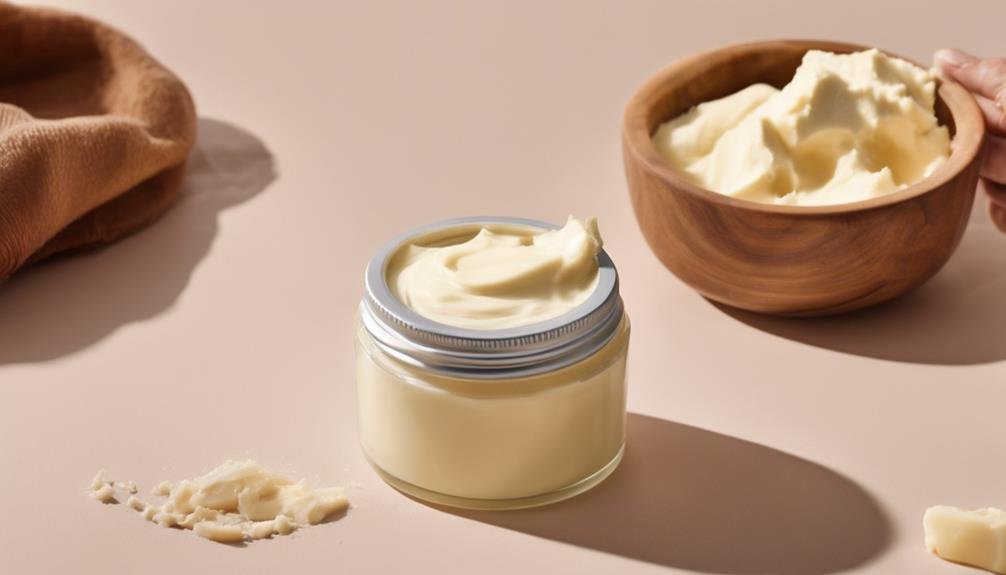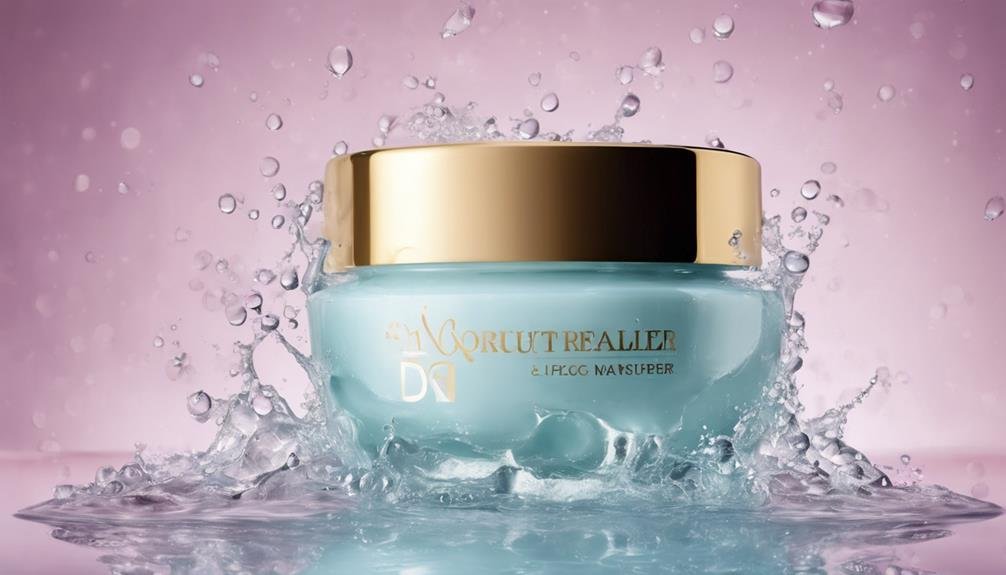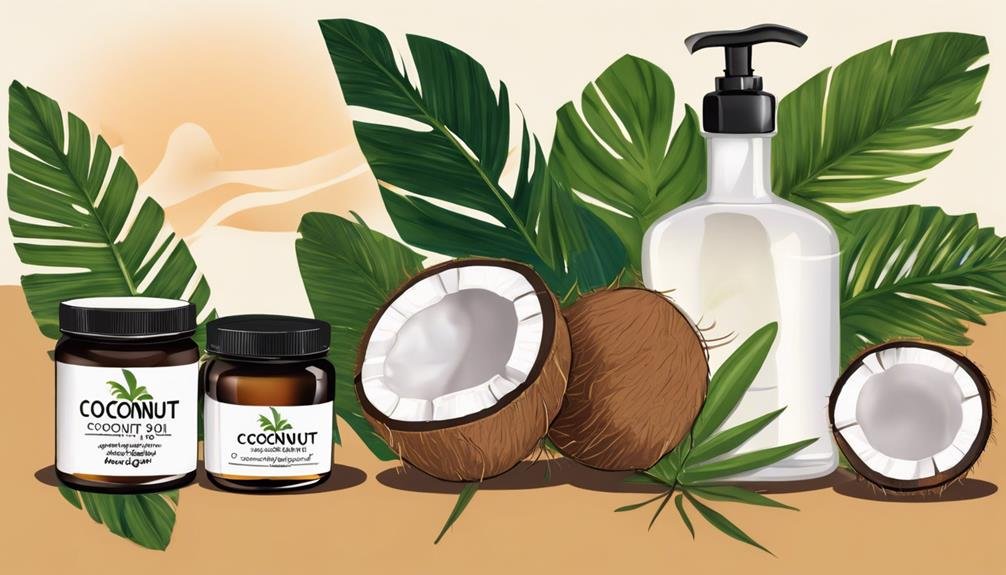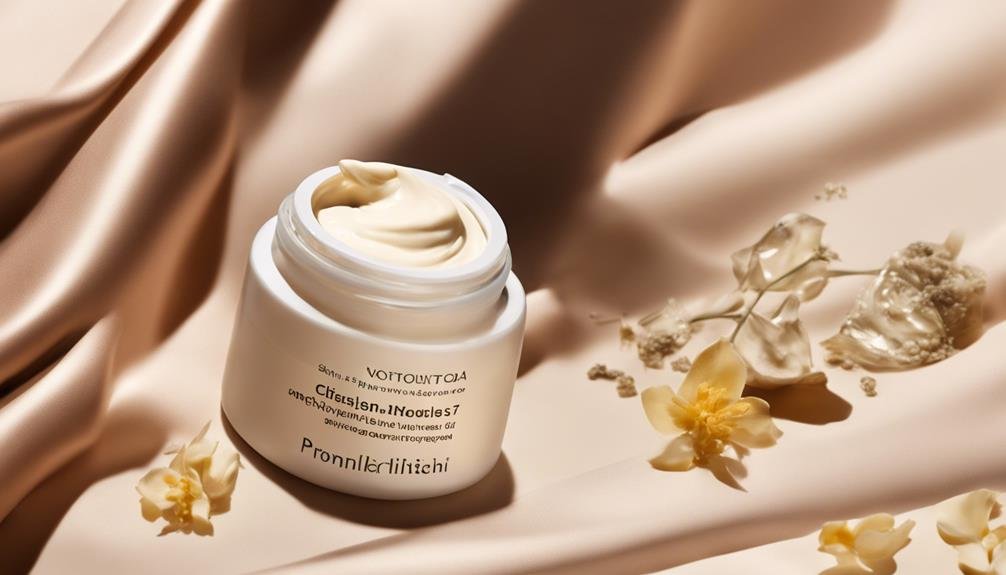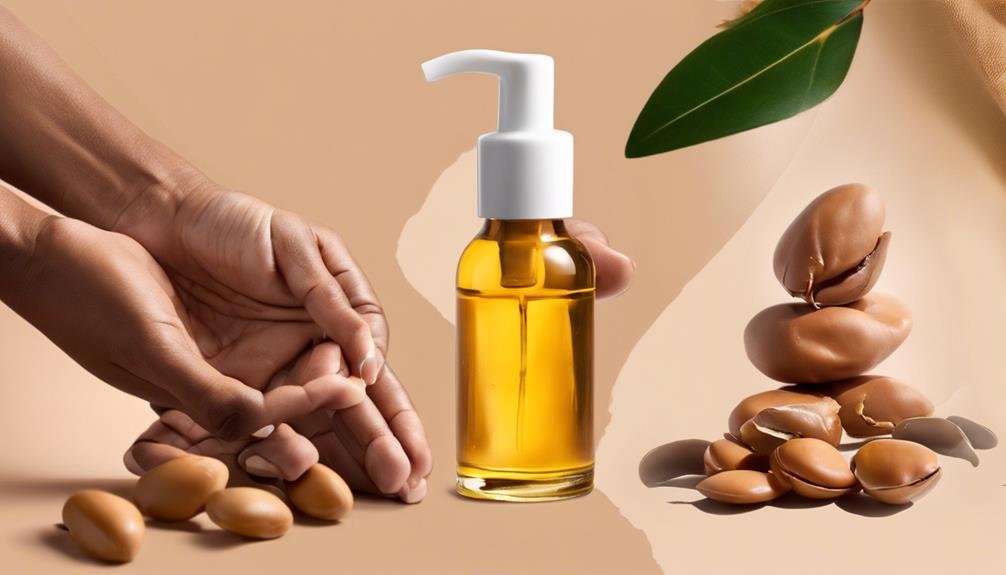Picture this: your skin feeling as soft and supple as a rose petal, devoid of dryness and discomfort. Ever wondered which moisturizers can truly transform your skin from parched to hydrated? Discover the magic of key ingredients like hyaluronic acid, ceramides, shea butter, aloe vera, and glycerin. But wait, there's more to uncover about these potent hydrators and how they work wonders for your dry skin.
Key Takeaways
- Look for moisturizers with Hyaluronic Acid to attract and retain moisture effectively.
- Choose products with Ceramides to maintain moisture and protect against environmental aggressors.
- Shea Butter acts as a rich emollient barrier to seal in moisture for dry skin.
- Aloe Vera provides hydration, cooling, and anti-inflammatory benefits.
- Glycerin is a humectant that hydrates, locks in moisture, and improves skin elasticity.
Hyaluronic Acid
When it comes to hydrating your dry skin effectively, one key ingredient to look for in moisturizers is hyaluronic acid. This powerful molecule is a humectant, meaning it attracts and retains moisture, helping to keep your skin hydrated and plump. Hyaluronic acid occurs naturally in the skin, but its levels decrease as we age, leading to drier, less elastic skin. By incorporating hyaluronic acid into your skincare routine, you can replenish your skin's moisture levels and improve its overall texture.
One of the main benefits of hyaluronic acid is its ability to hold up to 1000 times its weight in water, making it incredibly effective at hydrating the skin without making it feel greasy or heavy. This ingredient is suitable for all skin types, including sensitive and acne-prone skin, as it's lightweight and non-comedogenic.
When choosing a moisturizer with hyaluronic acid, opt for formulations that also contain emollients and occlusives to lock in the hydration and create a protective barrier on the skin.
Ceramides
To further enhance the hydration and barrier function of your skin, consider incorporating ceramides into your skincare routine. Ceramides are essential lipids naturally found in the skin's outermost layer, crucial for maintaining moisture and protecting against environmental aggressors. When choosing moisturizers with ceramides, look for products that contain a blend of different ceramide types to maximize benefits.
Here are some key points to keep in mind when selecting ceramide-infused products:
- Ceramide Types: Opt for products that contain a mix of ceramides such as Ceramide 1, 3, and 6-II for comprehensive skin barrier support.
- Formulation Stability: Ensure the product is packaged in a way that maintains the stability of ceramides to ensure effectiveness.
- Additional Ingredients: Look for ceramide products that also contain hydrating ingredients like glycerin or hyaluronic acid for added moisturizing benefits.
- Consistency: Incorporate ceramides consistently into your routine to see long-term improvements in skin hydration and barrier function.
Shea Butter
Shea butter, derived from the nut of the African shea tree, is a popular natural ingredient known for its rich emollient properties and nourishing benefits for dry skin. It's packed with fatty acids and vitamins, making it an excellent choice for hydrating and softening dry, flaky skin.
Shea butter acts as a protective barrier, sealing in moisture and preventing water loss, which is essential for maintaining skin's hydration levels. Additionally, it contains anti-inflammatory and antioxidant properties that can help soothe irritated skin and protect it from environmental damage.
When choosing a moisturizer with shea butter, look for products that feature it as one of the main ingredients to ensure you're reaping its full benefits. Whether in the form of body lotions, creams, or balms, shea butter can provide deep hydration and improve the overall health and appearance of your skin. Make sure to apply it generously to areas prone to dryness for best results.
Aloe Vera
Ever wondered about the soothing powers of a plant that can bring relief to dry, irritated skin? Aloe Vera is a natural ingredient with remarkable benefits for hydrating and calming dry skin. Here's why you should consider incorporating it into your skincare routine:
- Hydrating Properties: Aloe Vera is rich in water content, which helps to moisturize and hydrate dry skin effectively.
- Soothing Sensation: The gel-like consistency of Aloe Vera provides a cooling and soothing effect on dry, irritated skin.
- Anti-Inflammatory Benefits: Aloe Vera contains compounds that can help reduce inflammation, making it ideal for calming redness and irritation.
- Promotes Healing: This plant is known for its ability to accelerate the healing process of damaged skin, making it a great option for dry, flaky skin in need of repair.
When searching for a moisturizer to combat dry skin, look for products containing Aloe Vera to experience its nourishing and soothing effects firsthand.
Glycerin
With its reputation for attracting moisture and improving skin's hydration levels, glycerin stands out as a prominent ingredient in moisturizers designed for dry skin.
Glycerin, also known as glycerol, is a humectant, meaning it draws moisture from the air and deeper layers of the skin to hydrate the outer layer. This helps in creating a protective barrier that locks in moisture, leaving your skin feeling soft and supple.
When included in moisturizers, glycerin not only hydrates but also helps in maintaining the skin's natural moisture balance. Its lightweight texture makes it suitable for all skin types, including sensitive skin. Glycerin is non-comedogenic, making it an excellent choice for those prone to breakouts.
Furthermore, glycerin has been shown to improve skin elasticity and promote skin cell maturation, resulting in a smoother and more youthful appearance. Look for moisturizers containing glycerin high on the ingredient list for optimal hydration and skin barrier repair.
Squalane
Squalane, a lightweight and non-greasy oil derived from olives or sugarcane, has gained popularity in skincare products for its excellent moisturizing properties. This versatile ingredient helps lock in hydration and restore the skin's natural barrier function, making it a valuable addition to your skincare routine.
Here are some key benefits of squalane:
- Intense Hydration: Squalane is highly effective in hydrating the skin, leaving it soft and supple.
- Non-Comedogenic: It's non-comedogenic, making it suitable for all skin types, including acne-prone and sensitive skin.
- Antioxidant Properties: Squalane helps protect the skin from free radical damage, reducing signs of aging.
- Fast Absorption: Due to its lightweight texture, squalane is quickly absorbed by the skin without leaving a greasy residue.
Consider incorporating squalane into your skincare regimen to experience its nourishing and moisturizing benefits for dry skin.
Coconut Oil
Renowned for its versatility in skincare, Coconut Oil has long been celebrated for its multitude of benefits. This natural emollient is rich in fatty acids, making it an excellent moisturizer for dry skin. The fatty acids in coconut oil create a protective barrier that helps retain moisture in the skin, preventing dryness and flakiness.
Additionally, coconut oil contains anti-inflammatory properties that can soothe irritated skin and reduce redness.
When using coconut oil as a moisturizer, it's important to choose virgin or cold-pressed coconut oil to ensure that you're getting the most benefits for your skin. Applying coconut oil to damp skin can help lock in moisture more effectively. However, it's essential to do a patch test before using coconut oil on your face, as it can be comedogenic for some individuals, potentially clogging pores and causing breakouts.
Jojoba Oil
Curious about an effective natural moisturizer for dry skin? Look no further than jojoba oil. This versatile oil closely mimics the skin's natural oils, making it an excellent choice for hydrating dry skin. Jojoba oil is rich in vitamins and minerals, making it a nourishing option for those looking to improve skin health.
- Balancing Properties: Jojoba oil helps regulate oil production, making it suitable for all skin types, including oily and acne-prone skin.
- Anti-Inflammatory Benefits: The anti-inflammatory properties of jojoba oil can help calm irritated skin and reduce redness.
- Non-Comedogenic: This oil is non-comedogenic, meaning it won't clog pores, making it a great option for those prone to breakouts.
- Long-Lasting Hydration: Jojoba oil forms a protective barrier on the skin, locking in moisture and keeping the skin hydrated throughout the day.
Consider incorporating jojoba oil into your skincare routine to experience its moisturizing and skin-nourishing benefits firsthand.
Vitamin E
With its reputation for skin-nourishing properties, Vitamin E emerges as another beneficial option for addressing dry skin concerns after exploring the benefits of jojoba oil.
Vitamin E, also known as tocopherol, is a powerful antioxidant that helps protect the skin from damage caused by free radicals and environmental stressors. This vitamin is often found in skincare products due to its ability to moisturize and nourish the skin.
When it comes to dry skin, Vitamin E can be particularly helpful in improving hydration levels and promoting overall skin health. By incorporating Vitamin E into your skincare routine, you can potentially reduce the appearance of dryness and enhance the skin's natural barrier function.
Additionally, Vitamin E may aid in soothing irritation and inflammation, making it a versatile ingredient for those dealing with dry, sensitive skin.
Consider looking for moisturizers or serums enriched with Vitamin E to experience its hydrating and protective benefits firsthand. By incorporating this nutrient into your daily regimen, you may notice an improvement in your skin's moisture levels and overall appearance.
Colloidal Oatmeal
Colloidal oatmeal, a finely ground form of oats suspended in a liquid base, has gained recognition for its soothing and moisturizing properties in skincare. Its gentle nature makes it suitable for all skin types, particularly beneficial for those with dry, sensitive, or irritated skin. Here's why colloidal oatmeal is a great addition to your skincare routine:
- Natural Moisturizer: Colloidal oatmeal forms a protective barrier on the skin, trapping in moisture and preventing water loss.
- Anti-inflammatory Properties: It helps calm and reduce inflammation, making it ideal for soothing conditions like eczema and psoriasis.
- Rich in Antioxidants: The antioxidants in colloidal oatmeal help combat free radicals, which can contribute to premature skin aging.
- Gentle Exfoliator: Its texture can gently exfoliate the skin, removing dead cells and promoting a smoother complexion.
Including colloidal oatmeal in your skincare regimen can provide much-needed relief and hydration for your dry skin.
Argan Oil
If you're seeking another natural remedy to nourish and hydrate your skin, consider incorporating argan oil into your skincare routine. Argan oil, extracted from the kernels of the argan tree native to Morocco, is rich in essential fatty acids, antioxidants, and vitamins E and A. These components work together to deeply moisturize and repair dry, damaged skin.
The lightweight nature of argan oil allows it to be easily absorbed without clogging pores, making it suitable for all skin types, including oily and acne-prone skin.
Argan oil is known for its ability to improve skin elasticity, reduce inflammation, and promote a radiant complexion. Its anti-aging properties help minimize the appearance of fine lines and wrinkles, while its moisturizing effects soothe rough patches and flakiness.
To incorporate argan oil into your skincare routine, simply apply a few drops to your face and neck after cleansing and toning. You can also mix it with your moisturizer for an extra hydration boost. Experience the nourishing benefits of argan oil for soft, supple skin.
Rosehip Seed Oil
Rosehip seed oil, derived from the seeds of rose bushes, is a powerhouse ingredient for addressing dry skin concerns. This natural oil is rich in essential fatty acids and antioxidants, making it a popular choice for nourishing and hydrating the skin.
Here are some reasons why rosehip seed oil is a fantastic option for combating dry skin:
- Hydration: The high levels of fatty acids in rosehip seed oil help to moisturize and hydrate dry skin, leaving it feeling soft and supple.
- Repair: Rosehip seed oil is known for its ability to repair damaged skin barrier, which is crucial for locking in moisture and preventing further water loss.
- Anti-inflammatory: The anti-inflammatory properties of this oil can help soothe irritated skin and reduce redness caused by dryness.
- Anti-aging: Rich in antioxidants like vitamins A and C, rosehip seed oil can also help improve skin elasticity and reduce the appearance of fine lines and wrinkles.
Consider incorporating rosehip seed oil into your skincare routine for a natural and effective solution to dry skin.
Frequently Asked Questions
Can I Use These Moisturizers on Sensitive Skin?
You can use these moisturizers on sensitive skin. Look for products labeled hypoallergenic or formulated for sensitive skin. Patch test on a small area first to ensure no irritation. Consult a dermatologist for personalized recommendations.
Are These Moisturizers Suitable for Oily Skin Types?
Yes, these moisturizers are suitable for oily skin types. They are formulated to provide hydration without clogging pores or exacerbating oiliness. Look for lightweight, non-comedogenic options with ingredients like hyaluronic acid or glycerin for best results.
Can These Moisturizers Be Used Under Makeup?
Yes, these moisturizers can be used under makeup. They provide a hydrating base that can help makeup glide on smoothly. Look for oil-free options to avoid potential makeup sliding and ensure a flawless finish.
Do These Moisturizers Have a Strong Scent?
If you prefer unscented products, some effective moisturizers for dry skin offer fragrance-free options. Check the label or product description for details on scent intensity. Remember, everyone's sensitivity varies, and what may be strong to one may be mild to another.
Are These Moisturizers Safe to Use During Pregnancy?
During pregnancy, it's crucial to use safe moisturizers. Look for products without harmful chemicals like retinoids or salicylic acid. Opt for gentle, fragrance-free options to minimize risks. Always consult with your healthcare provider for personalized recommendations.
Conclusion
In conclusion, when it comes to combating dry skin, look for moisturizers containing key ingredients like hyaluronic acid, ceramides, shea butter, aloe vera, glycerin, vitamin E, colloidal oatmeal, argan oil, and rosehip seed oil. These powerhouse ingredients work together to provide intense hydration and repair the skin's moisture barrier, leaving you with a smooth and healthy complexion that will make your skin feel like a refreshing oasis in a desert of dryness.



